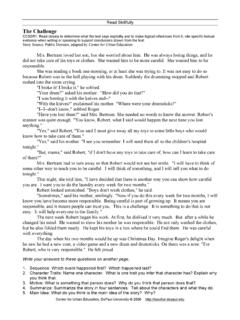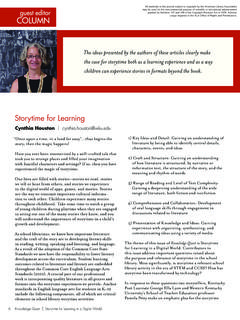Transcription of STORIES FROM THE HISTORY OF ROME - …
1 STORIES FROM THE HISTORY OF ROMESTORIES FROM THE HISTORY OF ROMEBY MRS. BEESLY YESTERDAY S CLASSICSCHAPEL HILL, NORTH CAROLINAC over and arrangement 2008 Yesterday s Classics, edition, first published in 2008 by Yesterday s Classics, an imprint of Yesterday s Classics, LLC, is an unabridged republi cation of the work originally published by Macmillan and Company in 1878. For the complete listing of the books that are published by Yesterday s Classics, please visit Yesterday s Classics is the publishing arm of the Baldwin Online Children s Literature Project which presents the complete text of hun dreds of classic books for children at : 1-59915-264-9 ISBN-13.
2 978-1-59915-264-6 Yesterday s Classics, LLC PO Box 3418 Chapel Hill, NC 27515 PREFACEThe writer of this little book was not satisfied that her children should hear nothing but fairy tales and the STORIES of nursery life, now so popular. But she could find nothing else fit to read to them. There are, indeed, plenty of story -books drawing their materials from HISTORY , and professing to be intended for children.
3 But they are not suited to very young children. They abound in words and ideas which a child of four or six years old not only does not understand, but cannot be made to understand. The writer, however, believed that it was quite possible to put portions of Livy and Plutarch into language which should need little or no explanation even to children of that age. She accordingly made the experiment. One story after another was written and read to her little boys. Whenever she discovered that a word or idea was unintelligible to them, she took pains to simplify it.
4 She found that they thoroughly enjoyed these old tales from Roman HISTORY , and liked to hear them repeated again and again. She has thought, there-fore, that if published they might perhaps supply a want that may have been felt by other was necessary that the STORIES should be such as would interest little children. But the writer has also selected them with a view to illustrate the two sentiments most characteristic of Roman manners duty to parents and duty to country. She has, moreover, tried to indicate that the latter of these sentiments took precedence of the former.
5 A healthy moral lesson is thus conveyed, while at the same time the most essential feature of the Roman civilization is impressed on the no one will be found to raise the dull objection that many of these tales are not strictly true. Being typical of Roman manners, they are true in a more real sense than many a well attested but less, characteristic fact. They undoubtedly helped to create in Romans those virtues which they professed to record. To the young, aye, and to older persons, it is more important to have heard that Brutus beheaded his sons and that Mucius thrust his hand into the flame, than to be acquainted with the most approved theories as to the origin of the Plebs or the functions of the three Comitia.
6 May it be long before these old legends are banished from Roman HISTORY in the name of a pedantic and unprofitable accuracy!ContentsThe Building of Rome I..1 The Horatii and the CuriatiiII..5 Brutus and His SonsIII..13 How Lars Porsenna Besieged IV. Rome ..17 Caius Marcius and His MotherV..23 The Deeds of the FabiiVI..34 CincinnatusVII..42 The Battle of CorbioVIII..48 How the Romans Won Two IX. Cities ..53 The Taking of RomeX..62 The Gulf in the ForumXI..74 The story of Titus ManliusXII.
7 76 The Death of DeciusXIII..85 The Caudine ForksXIV..93 The Two FabiiXV..104 How Pyrrhus Fought Against XVI. Rome ..109 1 CHAPTER ITHE BuIldIng of RomE There once reigned in a town called Alba in Italy a king whose name was Numitor. He had a brother called Amulius, who was a proud and wicked man, and could not bear that his elder brother should be king over him. So Amulius plotted against his brother. He got together a number of men who were as bad and cruel as himself, and they attacked Numitor and drove him from his throne, and made Amulius king in his stead.
8 They took the sons of Numitor, and his daughter Rhea Silvia, and killed them. Then Amulius seized the two little sons of Rhea Silvia, who were still only babies; he gave them to his soldiers, and told them to throw the poor little boys into the River Tiber. Then, thought he, they will be drowned. There will be none of my brother s children left to trouble me, and I shall be king all my life. The soldiers took the two babies in their cradle, lying side by side fast asleep, and carried them to the river. 2 STORIES FROM THE HISTORY OF ROMENow, there had been a great deal of rain, and the Tiber had overflowed its banks, so that the men could not put the children in the deep part of the river, but only at the edge, where the water was shallow.
9 However, they thought that they would have obeyed the orders of Amulius if they left the little boys there. So they put the cradle down in the water, and went away. But the sun was shining, and the waters were sinking fast; soon the dry land began to show itself; the cradle stood still, and the waters left it on the bank and ran back into their bed. There lived not far from the Tiber a shepherd whose name was Faustulus. He was walking by the side of the river, when he saw a cradle lying under a fig-tree, and beside the cradle stood a great she-wolf.
10 Faustulus was very much astonished, and ran quickly to see what this might mean. When he got near, he saw that in the cradle were two beautiful little baby boys, and the wolf was feeding them with her milk, just as if they had been her own little ones. But when she saw Faustulus, she fled away into the woods; and he took the children and carried them home to his wife. So these two kind people loved the boys and brought them up like their own sons. Romulus and Remus, so the boys were called, grew up strong and bold and active.


















